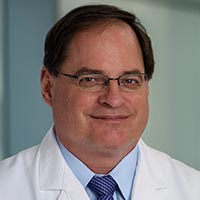
Lynn Huffman, M.D.
- Cardiovascular and Thoracic Surgery
- Heart Rhythm Treatment/Electrophysiology
- Heart Transplant Surgery
Biography
Lynn Huffman, M.D., is an Assistant Professor in the Department of Cardiothoracic Surgery at UT Southwestern Medical Center. He specializes in heart valve repair and replacement as well as heart transplants, ventricular assist devices, and ECMO.
Dr. Huffman earned undergraduate degrees in chemistry and mathematics and a master’s degree in chemistry at the University of Illinois. He earned his medical degree at the University of Michigan and completed residencies in general surgery and thoracic surgery at the University of Cincinnati.
He performed an additional residency in thoracic surgery at the University of Michigan and then received advanced training in cardiopulmonary transplant and mechanical assist devices through a fellowship at the University of Pittsburgh Medical Center.
As a clinical researcher, Dr. Huffman is interested in trends in cardiac surgery that improve survival. He also teaches medical students and residents.
Dr. Huffman is a member of the Society for Thoracic Surgeons, the American College of Surgeons, and the Association of Military Surgeons of the United States. He is a major in the United States Army Medical Corp, Reserve.
Meet Dr. Huffman
Cardiothoracic Surgeon in Dallas
Skilled in both traditional and minimally invasive techniques, cardiothoracic surgeon Lynn Huffman, M.D., specializes in adult heart surgery, including complex coronary artery bypass surgery, aortic valve replacement (both surgically and transcatheter), advanced heart failure therapies including ECMO and LVAD implantation, heart and lung transplantation, and complex laser lead extraction.
As a member of the advanced heart failure therapies and transplant teams, he also provides support for acutely and chronically failing hearts and lungs.
These therapies can include ECMO, a procedure that uses a machine to support the lungs and heart for either short-term recovery or as a bridge to advanced therapies. Dr. Huffman received specialized training in this technology through a fellowship at the University of Pittsburgh Medical Center’s Cardiopulmonary and Mechanical Circulatory Support Program.
An Evolution in Treatment
Aortic valve replacement is in evolution, and Dr. Huffman doesn’t always recommend surgical valve replacement. For patients who are at increased risk of complications, he offers transcatheter aortic valve replacement. Access varies, depending on a patient’s individual situation.
“We’re able to offer transcatheter valve replacement through the femoral artery, subclavian artery, directly through the ascending aorta, and through the left chest wall to access the apex of the heart. The goal is to give patients a repair that’s durable, competent, and safe,” Dr. Huffman says.
“It’s not the way we do it that counts. It’s what’s best for the patient in the long run.”
Another area of Dr. Huffman’s expertise is complex laser lead extraction for implantable pacemaker and defibrillator devices that become infected or wear out. Providing this service in the operating room offers an extra margin of patient safety if an emergency occurs.
Patient-Focused Care
Dr. Huffman loves seeing his patients’ lives improve quickly after surgery.
“When we fix a valve, do a coronary bypass, or perform any heart surgery or transplant, the patients soon have more energy, can concentrate better, can breathe more easily, and their quality of life is significantly improved,” he says.
With his patients, Dr. Huffman offers as much information as possible to help them make treatment decisions.
“I tell my patients that the right decision is the one they make and are comfortable with. They need to have a good understanding of their disease process in order to make the decision that is right for them” he says. “I’d say the same thing to my own mother or father.”
In the Classroom
When he’s not in the operating room, Dr. Huffman enjoys teaching medical students and residents, which also serves as a way for him to stay on top of the latest techniques and ideas.
“To be able to teach something, you have to really understand it,” he says. “We constantly review and contribute to the current literature and protocols because techniques and ideas are always evolving.”
Education & Training
- Fellowship - University of Pittsburgh Medical Center (2013-2014), Cardiopulmonary Transplant and Assist Device
- Fellowship - University of Michigan Health Systems (2009-2011), Thoracic Surgery
- Residency - University of Cincinnati College of Medicine (2008-2009), Thoracic Surgery
- Residency - University of Cincinnati Medical Center (2001-2008), General Surgery
- Medical School - University of Michigan Medical School (1997-2001)
Clinical Focus
- Heart Rhythm Treatment/Electrophysiology
- Heart Transplant Surgery
- Open Heart Surgery
- Advanced Cardiac Therapies
- Surgical Treatment of Thoracic Aortic Disease
- Adult Congenital Heart Surgery
- Heart Valve Repair/Replacement
- Transcatheter Aortic Valve Replacement Surgery
Q&A by Dr. Huffman
Results: 1 Locations
Clinical Heart and Vascular Center
at West Campus Building 3 2001 Inwood Road, 5th FloorDallas, Texas 75390 214-645-8000 Directions to Clinical Heart and Vascular Center at West Campus Building 3, Dallas Parking Info for Clinical Heart and Vascular Center